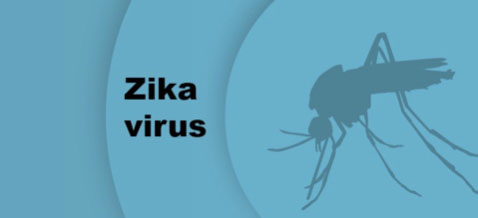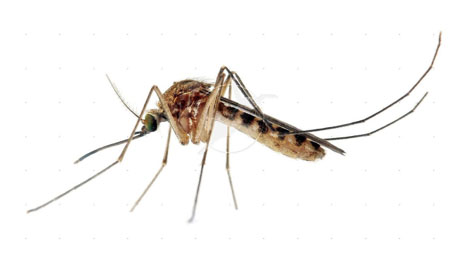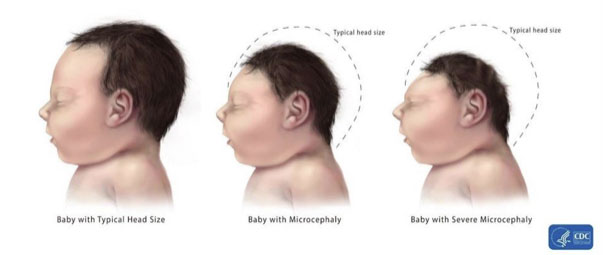West Nile & Zika Virus
What is West Nile Virus?
West Nile Virus, a mosquito-borne infection that can cause serious illness, was found in Wisconsin beginning in 2001. It was first identified in the United States in 1999.
In nature, the virus cycles between birds and mosquitoes. It is only when a mosquito infected with the virus bites a person instead of a bird that people become exposed to this virus. As the mosquito season progresses, more mosquitoes are infected with the virus increasing the risk that people being bitten by mosquitoes can become infected with the virus.
Most people infected with West Nile virus do not become ill. Symptoms can occur 5 to 15 days after exposure. About 20% of people infected with the virus have mild to moderate symptoms such as: a fever with headache, body ache, a skin rash, and swollen lymph nodes. Less than 1% or about 1 out of 150 people become severely ill with symptoms that can include: severe headache, high fever, neck stiffness, disorientation, tremors, coma or paralysis. Approximately 10% of the cases of severe illness are fatal. People over 50 years of age are at increased risk of severe disease.
There is no specific treatment for West Nile virus other than to treat symptoms and offer supportive care. If you think you have West Nile virus infection, contact your physician.
Prevention Is the Key
Preventing mosquito bites will prevent West Nile virus infection. Taking an active role to decrease exposure to mosquitoes and the infections they may carry can reduce your chances of bites:
- Make sure your home window and door screens are in good repair to prevent mosquito entry.
- Limit time spent outdoors at dawn and dusk during mosquito season (June to September) or other times mosquitoes are active.
- Wear shoes, socks, long sleeve shirts and long pants when outdoors.
- Use an insect repellent when outdoors.
Use Repellents Safely
- Choose a product that meets your needs for the time you will be outdoors and the amount of mosquito activity.
- Use repellent products according to directions.
- Spray repellents sparingly and only on exposed skin or top of clothing.
- Do not apply repellents in a confined space.
- Do not apply repellents to children’s hands or allow them to apply repellents.
- Wash treated skin when protection is no longer needed.
- The most effective repellents contain DEET. Products containing up to 30% DEET are considered safe in routine control of ticks and mosquitoes in adults and children over 2 months of age.
- No adverse effects from DEET use have been reported in pregnant or lactating women.
Stop Mosquitos
All mosquitoes need water to lay their eggs and complete their life cycle. Reducing or eliminating standing water reduces potential breeding sites, mosquito numbers and the risk for mosquito bites.
The following steps should be taken:
- Dispose of water-holding cans and containers.
- Remove discarded tires.
- Drill holes in the bottoms of recycling containers kept outdoors.
- Ensure that gutters and downspouts are clean and drain properly.
- Change birdbath water regularly.
- Turn over wheelbarrows, boats and wading pools when not in use.
- Aerate ornamental pools and water gardens and stock them with fish that eat mosquito larvae.
- Drain water from pool covers.
- Clean and chlorinate swimming pools, outdoor saunas and hot tubs and cover when not in use.
- Prevent water from collecting in low-lying areas on your property.
- Use yellow “bug” lighting outdoors.
Monitoring West Nile Virus in Wisconsin
The Department of Health Services has monitored the spread of West Nile virus since 2001. The surveillance program monitors wild birds, horses, mosquitoes and humans for West Nile virus.
Wisconsin began testing dead wild birds for West Nile virus in 2001.
For More Information Visit:
What Is Zika Virus?

Per the Centers for Disease Control and Prevention (CDC), Zika virus disease is caused by the Zika virus, which is spread to people primarily through the bite of an infected mosquito (Aedes aegypti and Aedes albopictus). The illness is usually mild with symptoms lasting up to a week, and many people do not have symptoms or will have only mild symptoms. However, Zika virus infection during pregnancy can cause a serious birth defect called microcephaly and other severe brain defects.
Note: The mosquitoes that can become infected with and spread Zika virus live in many parts of the world, including parts of the United States. The species of mosquitoes that can transmit Zika virus are not found in Wisconsin.
How Zika Spreads

Protect yourself and your family from mosquito bites all day and night, whether you are inside or outside. A mosquito becomes infected when it bites a person already infected with Zika. That mosquito can then spread the virus by biting more people. Zika virus can also spread:
- During sex with a person who has Zika to his or her sex partners.
- From a pregnant woman to her fetus during pregnancy or around the time of birth.
- Through blood transfusion (likely but not confirmed).
Zika Symptoms
Many people infected with Zika won’t have symptoms or will only have mild symptoms. The most common symptoms are:
- Fever
- Rash
- Joint pain
- Red eyes
Other symptoms include:
- Muscle pain
- Headache
Symptoms can last for several days to a week. People usually don’t get sick enough to go to the hospital, and they very rarely die of Zika. Once a person has been infected with Zika, they are likely to be protected from future infections.
Why Zika is Risky for Some People
Zika infection during pregnancy can cause fetuses to have a birth defect of the brain called microcephaly. Other problems have been detected among fetuses and infants infected with Zika virus before birth, such as defects of the eye, hearing deficits, and impaired growth. There have also been increased reports of Guillain-Barré syndrome, an uncommon sickness of the nervous system, in areas affected by Zika.

Current Zika Outbreak
Zika outbreaks are currently happening in many countries and territories. The mosquitoes that can become infected with and spread Zika live in many parts of the world, including parts of the United States. The species of mosquitoes that can transmit Zika virus are not found in Wisconsin.
Zika Information for Travelers:
In response to ongoing outbreaks in both North and South America, the U.S. Centers for Disease Control and Prevention (CDC) has issued travel notices for people traveling to areas where Zika is being spread. Pregnant women should postpone travel to areas affected by Zika.
Specific areas where Zika virus is spreading are often difficult to determine and are likely to change over time. If traveling, please visit the CDC Travelers’ Health website (cdc.gov/travel/page/zika-travel-information) for the most recent travel information.
How to Prevent Zika
There is no vaccine to prevent Zika. The best way to prevent diseases spread by mosquitoes is to protect yourself and your family from mosquito bites. Here’s how:
- Wear long-sleeved shirts and long pants.
- Stay in places with air conditioning and window and door screens to keep mosquitoes outside.
- Take steps to control mosquitoes inside and outside your home.
- Treat your clothing and gear with permethrin or buy pre-treated items.
- Use Environmental Protection Agency (EPA)-registered insect repellents. Always follow the product label instructions.
- When used as directed, these insect repellents are proven safe and effective even for pregnant and breastfeeding women.
- Do not use insect repellents on babies younger than 2 months old.
- Do not use products containing oil of lemon eucalyptus or para-menthane-diol on children younger than 3 years old.
- Mosquito netting can be used to cover babies younger than 2 months old in carriers, strollers, or cribs to protect them from mosquito bites.
- Sleep under a mosquito bed net if air conditioned or screened rooms are not available or if sleeping outdoors.
- Prevent sexual transmission of Zika by using condoms or not having sex.
What to Do if You Have Zika
There is no specific medicine to treat Zika. Treat the symptoms:
- Get plenty of rest.
- Drink fluids to prevent dehydration.
- Take medicine such as acetaminophen to reduce fever and pain.
- Do not take aspirin or other non-steroidal anti-inflammatory drugs.
- If you are taking medicine for another medical condition, talk to your healthcare provider before taking additional medication.
To help prevent others from getting sick, strictly follow steps to prevent mosquito bites during the first week of illness.
